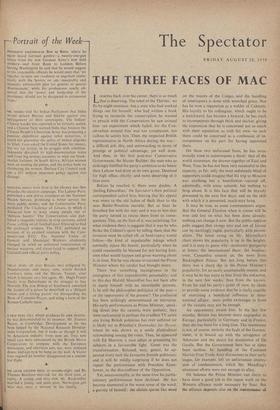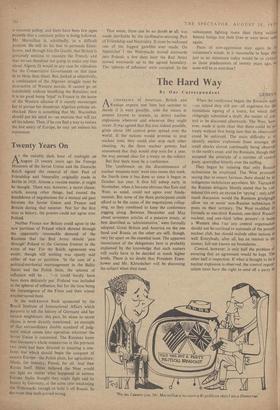THE THREE FACES OF MAC
Lookitqc back over his career, there is so much that is deserving. The rebel of the Thirties: no fly-by-night mutineer, but a man who had worked things out for himself; who had written a book trying to reconcile the conservatism he wanted to preach with the Conservatism he saw around him—an experiment which failed, for the Con- servatism around him was too complacent, too callous to satisfy him. Then, the respected British representative in North Africa during the war— a difficult job, this, and unrewarding in terms of prestige or political advantage; yet well done. And then, in the first post-war Conservative Government, the Master Builder; the man who so strikingly fulfilled the party's ambition to do better than Labour had done at its own game. Destined for high office, clearly; and more deserving of it than most.
Before he reached it, there were doubts. A 'peeling Edwardian,' the Spectator's then political correspondent called him, hinting that his appeal was more to the old ladies of Bath than to the new Butler-Woolton recruits. But at Suez he breathed fire with the rest; and it was to him that the party turned to rescue them from its conse- quences. This, on the face of it, was surprising; for what evidence there is suggests that it was he who broke the Cabinet's spirit by telling them that the invasion must be called off, or bankruptcy would follow—the kind of unpalatable tidings which normally injure the bearer, particularly when he could reasonably be blamed for not having fore- seen what would happen and given warning about it, in time. Yet he was chosen to succeed the Prime Minister whom his verdict had brought down.
There was something incongruous in the emergence of this unpredictable personality; and to this day Harold Macmillan has not been able to equip himself with an identifiable persona. Is he still the philosopher-politician of the past- or the opportunist of the present? The confusion has been strikingly demonstrated on television. His early performances as Prime Minister, speak- ing direct into the camera, were pathetic; they were caricatured in perhaps the cruellest TV satire any living British politician has ever suffered (or is likely to) in Priestley's Doomsday for Dyson, where he was shown as a senile platitudinist rationalising among the. ruins. Then, he appeared with Ed Murrow, a man adept at presenting his subjects in a favourable light. Great was the transformation. Relaxed, easy, genial, he ap- peared every inch the favourite fireside politician; and it will be mildly surprising if he does not repeat the performance with President Eisen- hower, to the discomfiture of the Opposition.
Yet, unaccountably, at the same time his parlia- mentary performances have declined. He has become mannered in the worst sense of the word, a parody of himself the cliches sprout like weed
on the waters of the Congo, and the handling of interrupters is done with wretched grace. Nor has he won a reputation as a welder of Cabinets. His loyalty to his colleagues, which ought to be a watchword, has become a byword; he has stuck to incompetents through thick and thicker, giving the impression that he is concerned not so much with their reputation as with his own—to sack them could be construed as a confession of in- competence on his part for having appointed them.
On these two unfocused faces, he has occa- sionally tried to superimpose a third: that of the world statesman, the drawer-together of East and West. True, he has not been very successful in this capacity, so far; only the most sedulously blind of supporter& could imagine that his trip to Moscow was anything but a humiliation—carried off,. admittedly, with some aplomb; but nothing to brag about. It is this face that will be bravely presented in the next few days; and on the skill with which it is presented, much may hang.
It may be true, as some commentators argue, that the General Election when it comes will be won and lost on what has been done already; nothing can change it now. But the public-opinion polls suggest that swings into and out of favour can be, startlingly rapid; .particularly with person- alities. The latest swing on Mr. Macmillan's chart shows his popularity is up in the heights, and it is easy to guess why—economic prosperity. at home; the international thaw; the weather; even, Cassandra assures us, the news from Buckingham Palace. But not long before this there was a sharp dip in the Prime Minister's popularity, for no easily ascertainable reason; and it may be he has more to fear from the unknown, in the next few weeks, than from the known, From his and his party's point of view, he needs to provide some evidence that he is really capable of exercising a beneficial influence in inter- national affairs: mere polite exchanges in front of the camera may not be enough.
An opportunity awaits him. In the last few months, Britain has become more unpopular in Europe, particularly in Germany and in France, than she has been for a long time. The resentment is not, of course, entirely the fault of the Govern- ment; it is bound up with the arrogance of Adenauer and the desire for dominance of De Gaulle. But the Government here has at times been tactless. Its handling of the Common Market/Free Trade Area discussions in their early 'stages, for example', left an unfortunate impres- sion of condescension, which Mr. Maudling's strenuous efforts were not enough to allay.
On balance the Prime Minister can claim to have done a good job in the repair work on the Western alliance made necessary by Suez. Rut the alliance depends also on the maintenance of
a common policy; and there have been few signs recently that a common policy is being followed. Mr. Macmillan is, admittedly, in a difficult position. He will do his best to persuade Eisen- hower, and through him De Gaulle, that Britain is genuinely anxious to reassure the French, and that we are therefore not going to make any fuss about Algeria (it would in any case be ridiculous for the Conservative Government on this issue to be Hola than thou). But, looked at objectively, a continuance of the Algerian struggle must be destructive of Western morale. It cannot go on indefinitely without benefiting the Russians; and it is no good being 'loyal' to France in the name of the Western alliance if it merely encourages her to pursue her disastrous Algerian policies un- checked. Here is something that Mr. Macmillan should put his mind to—an exercise that will tax all his talents. Then, if he can find a way to restore the lost amity of Europe, he may yet redeem his reputation.















































 Previous page
Previous page